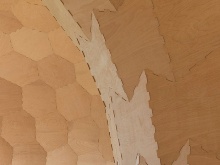Wood R³ - Resource Effective, Regional, Robotically Fabricated
Lightweight Wood Construction and Computational Design for Urban Renewal and Densification
Today building renovation and urban renewal make up an increasing share of the building sector in Germany and already account for more than half of all investments. Construction in existing building stock, and in particular urban densification, typically requires lightweight structures that introduce minimal loads and are capable of adapting to complex structural and geometric conditions. Digitally informed wood construction offers great potential in fulfilling these criteria, while at the same time meeting ecological, economic and social sustainability objectives: the material’s regional availability, positive carbon footprint, and low embodied energy provide an excellent basis to achieve these goals. Additionally, local wood construction has a strong social acceptance and it provides opportunities to strengthen the regional value added chain in Baden-Württemberg.
In the course of a previous research project (Robotic Fabrication in Timber Construction), the ICD and ITKE institutes developed a robotically fabricated lightweight timber construction system sourced from regional wood products. The building system and its computational design methodology were successfully tested through the design and construction of a large-scale prototype building for the horticultural exhibition of Baden-Württemberg in 2014 (Landesgartenschau Exhibition Hall). The use of a digital chain from design to fabrication of both structural and non-structural building parts results in a geometrically highly differentiated and efficient construction system. Its flexibility allows for adapting to diverse and complex boundary conditions while ensuring high structural performance, resource efficiency, as well as unmixed material use. Additionally, the developed system expands the application of regional timber products in accordance with future foresting strategies in Baden-Württemberg. Consequently, it is particularly suitable for sustainable construction in existing building stock.
The goal of the Wood R3 research project is to advance the development of a lightweight timber construction system that is suitable for urban densification, with particular consideration of the results of an accompanying life cycle analysis. The project involves further development of the building method (construction build up and connection details) as well as analysis of building physics (heat, humidity, and acoustics), with specific attention to criteria of durability. Additionally, structural performance analysis will be integrated, in order to expand the construction system’s range of application. In parallel, the digital design and fabrication methods will be further developed in order to improve the design workflow and enable a high level of digitally controlled prefabrication.
The development of the project can be followed on the ICD webpage, on FACEBOOK, on TWITTER and INSTAGRAM.
PROJECT TEAM
ICD Institute for Computational Design and Construction
Prof. A. Menges (PI), Oliver David Krieg, Abel Groenewolt
ITKE Institute of Building Structures and Structural Design
Prof. J. Knippers, Simon Bechert
LBP Chair in Building Physics
Matthias Fischer, Rafael Horn
ASSOCIATED PROJECT PARTNERS
Müllerblaustein Holzbau GmbH, Reinhold Müller
Landesbetrieb Forst Baden-Württemberg, Sebastian Schreiber
Dold Holzwerke GmbH, Herbert Dold
Gutex Holzfaserplattenwerk, H. Henselmann GmbH + Co KG, Reiner Palko
Cheret & Bozic Architekten, Prof. Dipl.-Ing. Peter Cheret
Ingenieurbüro Blaß & Eberhart, Prof. Dr.-Ing. Hans Joachim Blaß
Kuka Roboter GmbH, Frank Zimmermann
Clusterinitiative Forst und Holz Baden-Württemberg, Harald Wetzel
Institut für Baukonstruktion, Universität Stuttgart, Prof. Dipl.-Ing. Peter Cheret
Materialprüfungsanstalt Universität Stuttgart, Abt. Holzkonstruktionen, Dr. Simon Aicher
Holzbau und Baukonstruktionen, KIT Karlsruhe, Prof. Dr.-Ing. Hans Joachim Blaß
PROJECT FUNDING
Baden-Württemberg Stiftung
PROJECT SUPPORT
Pollmeier Massivholz GmbH & Co. KG
PROJECT INFORMATION
Oliver David Krieg, University of Stuttgart, Institute for Computational Design


